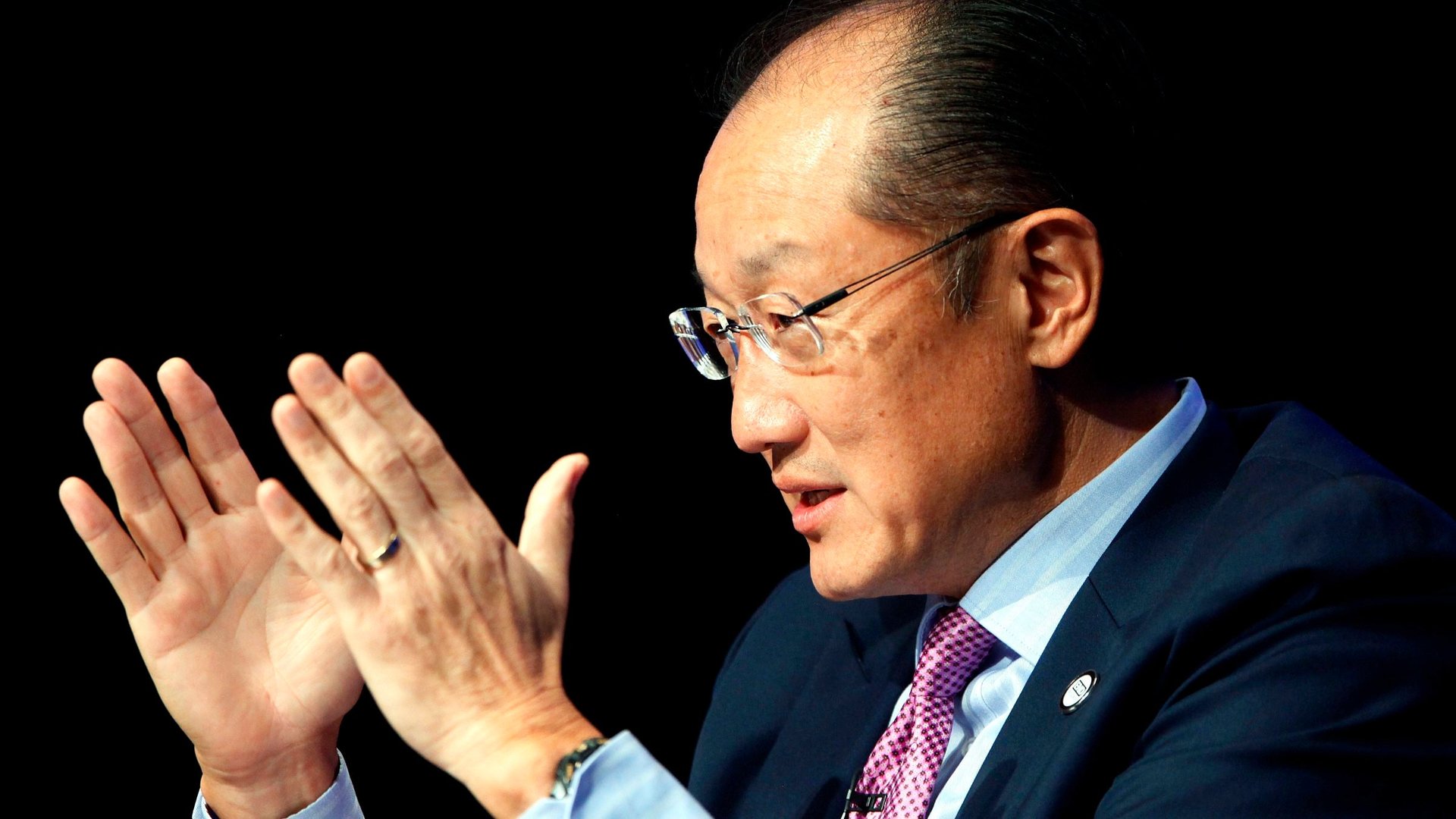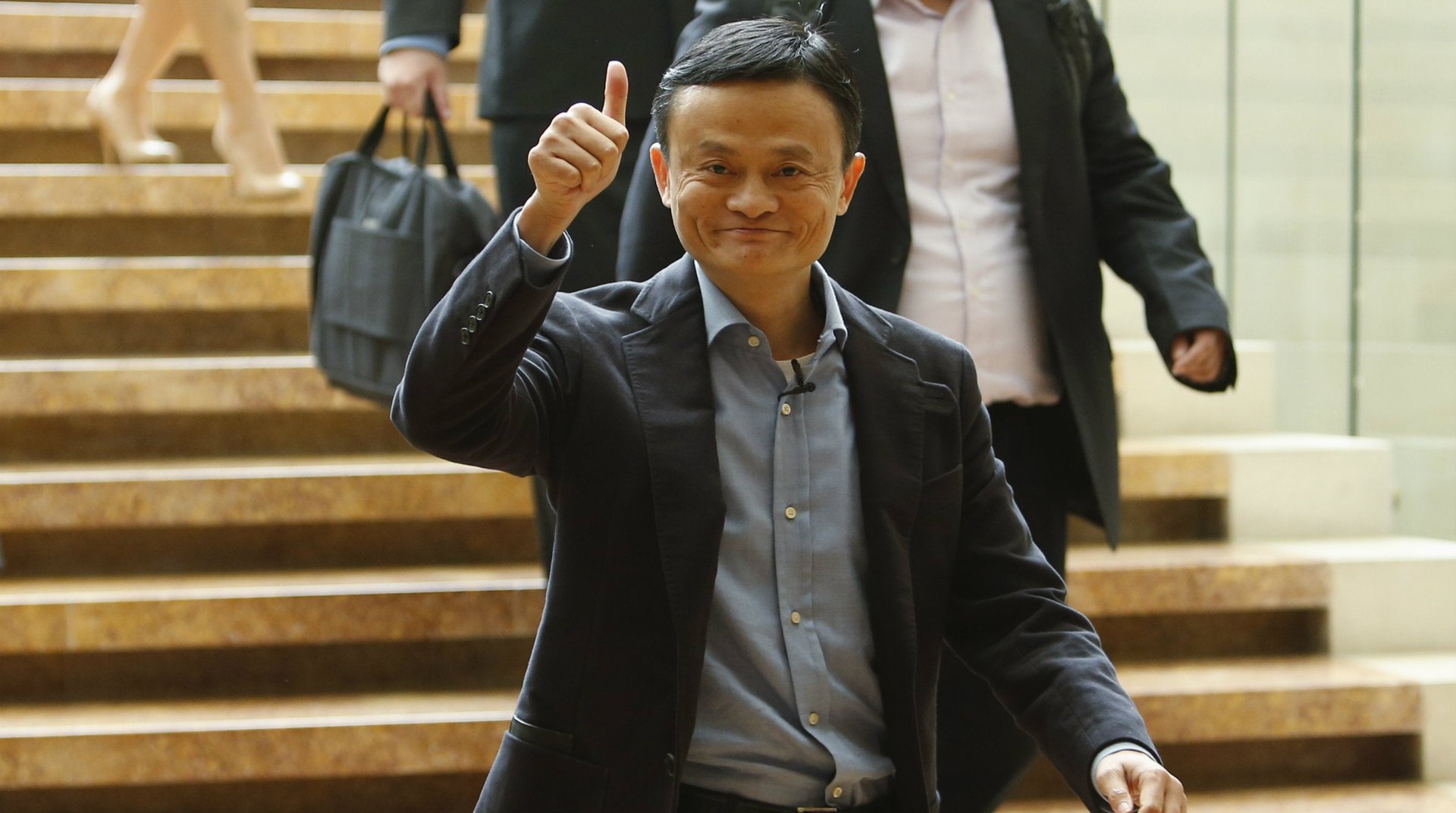World Bank president Jim Kim on Asian infrastructure investment, Africa rising, and his bromance with Jack Ma
It’s a heady time for global development finance. The World Bank is articulating a plan to end extreme poverty by 2030, and a new infrastructure fund created by China has raised eyebrows in Washington and dollars around the world. All the while, private-sector innovations are reshaping the needs of emerging market economies.


It’s a heady time for global development finance. The World Bank is articulating a plan to end extreme poverty by 2030, and a new infrastructure fund created by China has raised eyebrows in Washington and dollars around the world. All the while, private-sector innovations are reshaping the needs of emerging market economies.
Jim Yong Kim, the the HIV doctor and former Dartmouth College president who has headed up the World Bank since 2012, stopped by Quartz’s headquarters in New York this week to talk about the fast-changing world of development finance and his goal of ridding the world of extreme poverty. This transcript has been lightly edited for length and clarity.
On the Asian Infrastructure Investment Bank
Quartz: The US hasn’t exactly been thrilled with China’s new infrastructure bank. How do you feel about it?
Kim: As we sit back and look at the new development plan—17 goals, 169 targets— [and the goals of] the United Nations, that’s a multitrillion-dollar agenda. You know, all the multilateral development banks together are less than $200 billion. [So] how are we going to get there? We’ve been saying again and again and again that it’s going to take a new kind of collaboration.
There’s not anywhere near enough financing for infrastructure in Asia. And China, they’ve defined Asia very broadly—from Japan to the Middle East is really Asia now.
We look forward to working very closely with them. We just want them to use international standards.
The enemy is poverty, not another institution.
On the shortage of “bankable” projects
What’s been the holdup in financing all this infrastructure?
The problem is not capital. There’s so much capital sitting on the sidelines. We have very low interest rates; pension funds and sovereign wealth funds are sitting around thinking, isn’t there a better way for us to use our equity and have it grow a little bit more vigorously? And of course one potential area of investment would be infrastructure in developing countries.
But the key is, there are not enough bankable projects—bankable projects meaning, have you done all the work to, say, ensure that a hydroelectric power facility in the Democratic Republic of Congo [meets lending requirements]. None of the individual multilateral development banks can fund it unless we get involved and do all the project preparation—literally things like looking at the species of fish in the river to make sure we don’t make some species extinct over time. You [also] have to create almost a governance corridor to protect it, to make sure that upheavals in governments in that area are not going to lead to the stopping of this project.
The good news is it’s all possible and it could be a very good investment, but unless groups like the World Bank and the African Development Bank get involved, it really won’t happen.
On why he’s so impressed with Alibaba’s Jack Ma
What can we learn from China’s record of using development to fight poverty?
You know, I’ve gotten very close to Jack Ma of Alibaba. He reached out to me personally because they want to take the Alibaba model to Africa, they want to take the Alibaba model to South Asia, and to Latin America, and I’m sure you guys know about their model, but I’m just amazed at what these people can do. If China is not capable of delivering packages in time, what do you do? You take a bunch of farmers and create all these package delivery companies. And now, people in rural areas who otherwise might have gone to the city or not found work are running their own companies, and these are former farmers.
I saw him at Davos. The latest thing he told me was, “We’re identifying the villages where there is no access to internet. Then we go out there, as long as there is a road and there is cell phone service—and there is cell phone service just about everywhere—and I”—Jack told me this—”I go and find two or three young women who are very savvy and have learned computers. I give them a computer, and they start taking orders for the whole village.”
Everybody wants a washing machine, everybody wants these basic things, and they realize that they can either get in a car and drive 70 km to the city and buy a washing machine, or they can buy it online for half the cost and [get] a much better quality machine.
Now that the trucks are going out there delivering the washing machines, they are going back [to the cities] with products from that village, right? He is really changing, in a pretty fundamental way, the model of development. And very soon he’s going to have 2 billion customers. I facilitated meetings between Jack and various leaders of different countries, because he really wants to do this.
He’s very humble, extremely humble, and he’s now one of the wealthiest people in China. He doesn’t care about it; what he really wants is to contribute to development.

The other thing I love about Jack is he’s turning banking completely on its head. He says that by just watching people’s online behavior—how quickly they pay, how quickly they send their goods out, when they need money, when they don’t need money, how honest they are in providing feedback—that he has developed algorithm after algorithm for them, so he knows somebody’s credit risk and the volume they can handle the minute they put their [loan] application in.
Traditional banking is [to] know your customer, right? Shake your hand, what’s your collateral, what’s this person like. And he says, “I never want to meet these people. I don’t need to see their face. I don’t need to know anything about them. All I need to know is how they behave inside the Alibaba system.”
If you take that innovation, when you’re on Alibaba [and] you have to access to financial services, is that shadow banking, or is that innovative finance? There’s an argument right now in China. I think it’s incredible.
On the impact of internet access
We’re very interested in the idea of the next billion people to get access to the internet, who are coming online largely via mobile, mainly in emerging markets. What does this trend mean for development?
It’s huge for us. Our next world development report is going to be [about] the internet, and we are looking at very specific things for how getting online can transform prospects for development.
What would it mean [for example] if Alibaba could actually function in Africa? What it might mean is that we would focus more on providing energy in mini micro-grids, so you wouldn’t necessarily have to build these huge grids because it wouldn’t be the classic industrialization model of development. It would be different, it would be more village-ized, if you will. So you have to focus on roads, you have to focus on internet access, and we could probably get away with solar- and wind-based mini-grids, at least for a time. This is just really sort of greenfield thinking; we’re not sure if it’ll work, but we’ve got to look at it.
On the theme of Africa rising
What do you think of Africa’s potential for development?
I have been completely smitten with Africa for about 20 years. I’m an HIV doctor. From 1995 to 2000, my exposure to Africa was a continent that was in trouble—there were very high rates of HIV infection; no prospects for treatment; the notion that in some countries, 25% to 30% of the people were living with HIV; life expectancy had dropped 10, 15 years in some countries. It was at a terrible time.
If you had death rates and life expectancy that continued to plummet like that in Africa, you would not see Africa rising.
Now we have almost 10 million people win Africa on treatment. Like [in] lots of other places, it’s a manageable chronic disease now.
I feel like I have a personal stake in ensuring that Africa, in fact, rises.
What are the obstacles? There’ve been huge discoveries of mineral wealth, oil, precious metals, all throughout Africa. But we know that there is the so-called natural resources curse, where you have a rise in GDP, but because mineral extraction is not a job-rich kind of development path, you have rise in GDP without very much benefit for everyone. A huge part of Africa rising is going to have to be to ensure that mineral wealth is translated into real benefits for the entire population.
The other thing is agricultural productivity. Agricultural productivity has risen in so many places and not so much in Africa; Africa has really lagged behind for all different kinds of reasons—lack of power, lack of water, lack of access to new seeds, lack of access to technology that can increase productivity. But we know that in China, a 10% increase in agricultural productivity had four times greater impact than a 10% increase in manufacturing productivity. So we’ve really got to focus on agriculture in Africa, [where] 70% of the people live in rural areas still.
Do you ever foresee a time when the US does not insist on choosing the World Bank president?
I was the first World Bank president to ever have to actually go through an election. My friend [Nigerian finance minister Ngozi Okonjo-Iweala] was a real candidate, and there was a real vote, and I had to go to 22 countries in 14 days and campaign. I know for sure that there will always be a campaign now, there will always be other candidates.
Whether the president will always be an American, I don’t know. … But I think that you will never again see an IMF or a World Bank election without very strong contention, coming especially from the developing world.
Read other QZ & A interviews with…
- Nobel-prize winning economist Robert Shiller.
- The man behind the inequality opus, Thomas Piketty.